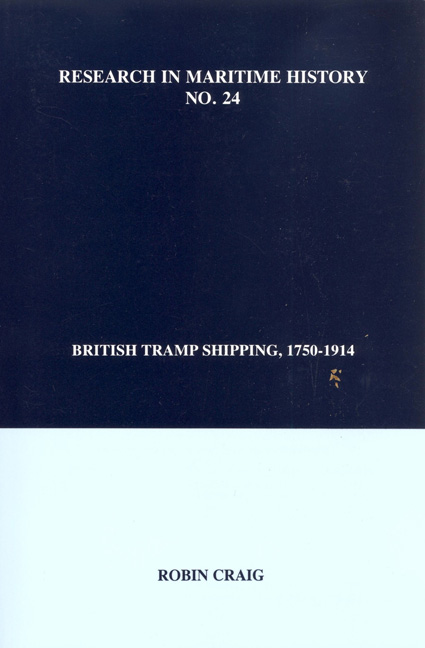Book contents
- Frontmatter
- Contents
- Introduction
- Tramp Shipping and Ownership
- The Trades
- The Seamen
- Tramp-Shipping Regions
- A. Wales
- “Industrial Glamorgan: The Ports and Shipping, c. 1750-1914”
- “Trade and Shipping in South Wales - The Radcliffe Company, 1882-1921”
- “The 1860s at Llanelli - A Dynamic Decade for Trade and Shipping”
- “Carmarthenshire Shipping in the Eighteen Forties”
- “Hetty Ellen of Aberystwyth and Doctor Livingstone”
- B. The Northwest
- C. The West Country
- D. The Northeast
- E. The Southeast
- F. The British Empire: Maritime Canada
- Bibliography
“Carmarthenshire Shipping in the Eighteen Forties”
from A. Wales
- Frontmatter
- Contents
- Introduction
- Tramp Shipping and Ownership
- The Trades
- The Seamen
- Tramp-Shipping Regions
- A. Wales
- “Industrial Glamorgan: The Ports and Shipping, c. 1750-1914”
- “Trade and Shipping in South Wales - The Radcliffe Company, 1882-1921”
- “The 1860s at Llanelli - A Dynamic Decade for Trade and Shipping”
- “Carmarthenshire Shipping in the Eighteen Forties”
- “Hetty Ellen of Aberystwyth and Doctor Livingstone”
- B. The Northwest
- C. The West Country
- D. The Northeast
- E. The Southeast
- F. The British Empire: Maritime Canada
- Bibliography
Summary
Stand on any eminence overlooking Carmarthen Bay - say, Castle Hill, Tenby, the ramparts of Llanstephan castle, or the furthest cliff of Worms Head - on a fine, clear day today, and the absence of commercial shipping might strike the most casual observer. This absence of seaborne commerce is a vivid reflection of the de-industralization of West Wales, since these waters were once well populated with shipping busily engaged in both local and deep-sea trades. The contrast between then and now is all the more striking when it is recalled that the hinterland was the scene of much pioneering industrial activity well before the dates generally assigned to what is called the industrial revolution. The speed with which these once well-populated waters has been emptied of shipping is illustrative of a much more rapid process of transformation which may in truth be named the de-industrialized revolution.
This paper seeks to make a small contribution to our understanding of what an observer might have seen if he looked seawards from a vantage point across Carmarthen Bay one hundred and forty years ago. This brief study derives from an analysis of two types of record, complementary in nature, but seldom used in conjunction. These are the Statutory Registers of Merchant Ships of the ports of Llanelli and Carmarthen, and the corresponding Crew Agreements. Taken together, these sources enable us to examine not only the physical description and ownership of all local vessels but also to analyse their voyages and their crews. To this end, all the appropriate registrations relating to our chosen period have been examined, as have the relevant Crew Agreements, in order that we may recreate a bird's-eye view, as it were, of local maritime activity in Carmarthen Bay.
A preliminary word is perhaps necessary concerning the sources used. Of the two disparate forms of record, the Statutory Registers were used to determine the tonnage and description of each vessel than afloat registered within the ports of Llanelli and Carmarthen. Recourse was also had to the registers of other ports where certain local vessels were registered. The Crew Agreements survive as a consequence of a system of seaman registration instituted under the terms of a wide-ranging Merchant Shipping Act in 1835.
- Type
- Chapter
- Information
- British Tramp Shipping, 1750–1914 , pp. 229 - 244Publisher: Liverpool University PressPrint publication year: 2003

